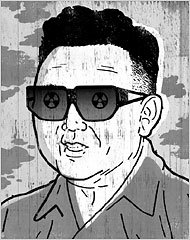
By B. R. MYERS
Seoul, South Korea
HOURS after Monday’s nuclear test, President Bush issued a stern warning to North Korea — but only against the passing of nuclear technology to other states or non-state entities. The president’s declaration thus reflected a confident consensus in Washington that while Kim Jong-il may try selling his nukes, he would never dream of using them himself. Why not? The explanation was given by a former national security adviser, Donald Gregg, on Monday: “Don’t panic. Kim Jong-il’s objective is survival ... not suicide.”
The same soothing logic could be applied to President Mahmoud Ahmadinejad of Iran, but of course it won’t be. These long-term diagnoses of Mr. Kim’s psyche are a roundabout way of saying that because he is not a fundamentalist Muslim, he is unlikely to do anything really crazy.
This sort of cultural profiling, however, can get us into real danger. Japan’s emperor during World War II, Hirohito, was neither religious nor suicidal, and he led his nation into a war that no rational leader could have hoped to win. The point is relevant, because although journalists persist in calling North Korea a Stalinist state, its worldview is far closer to that of fascist Japan.
Like the Japanese in the 1930’s, the North Koreans trace the origins of their race back thousands of years to a single progenitor, and claim that this pure bloodline makes them uniquely virtuous. The country’s mass games — government-choreographed spectacles with a cast of more than 100,000 — are often mistaken by foreign journalists as exercises in Stalinism. They are in fact celebrations of ethnic homogeneity. “No masses in the world,” the state-run Cheollima magazine reminded readers in 2005, “are purer and more upright than our masses.”
In state propaganda, Kim Jong-il is often linked, as Hirohito once was, to images of white horses, snow-capped mountain peaks and other symbols of racial purity. South Korea, on the other hand, is regarded as contaminated by too close contact with other races. At a recent meeting between generals from both Koreas, the North delegation’s leader condemned the South for allowing racial intermarriage. “Not a single drop of ink,” he intoned, “must be allowed to fall into the Han River.”
Naturally enough, the North Koreans’ race theory, like that of the Japanese fascists, actuates a blithe indifference to international law. A uniquely virtuous people has no reason to obey its moral inferiors, be they allies or enemies. China has now learned that despite decades of military and economic assistance it can draw on no residue of good will in dealing with Pyongyang.
Neither can the South Koreans, whom the North Koreans will revile for their ethnic treason no matter how much cash they pump northward. This utter imperviousness to gestures of friendship and conciliation bears obvious implications for the prospect of normal relations between North Korea and America.
The northern regime has so far restricted its racial propaganda to the home audience, because it wants the world to go on misperceiving it as a Stalinist state. This way we continue to pin our hopes on the kind of trust-building dialogue that worked so well with Communists in the 1980’s — and failed so disastrously with the pure-race crowd a half-century earlier.
While the North Koreans could kill a lot of people, they do not pose as great a threat to world security as imperial Japan did. Never have they shown any interest in forging an empire. All the same, the irrationality of their worldview is such that we should, at the very least, stop assuming that they would never use their own weaponry.
While Kim may not be suicidal himself, he shares Hirohito’s penchant for encouraging this quality in his people: “Defense until Death” is an increasingly popular slogan. In 2003 a colorful poster was disseminated to the foreign press showing a fat missile in flight with a suicide-readiness slogan on it: “Yankee, take a good hard look.” That isn’t bad advice.
B. R. Myers, an associate professor of North Korean studies at Korea University, is the author of “Han Sorya and North Korean Literature.”
http://www.nytimes.com/2006/10/12/opinion/12myers.html ◦

No comments:
Post a Comment